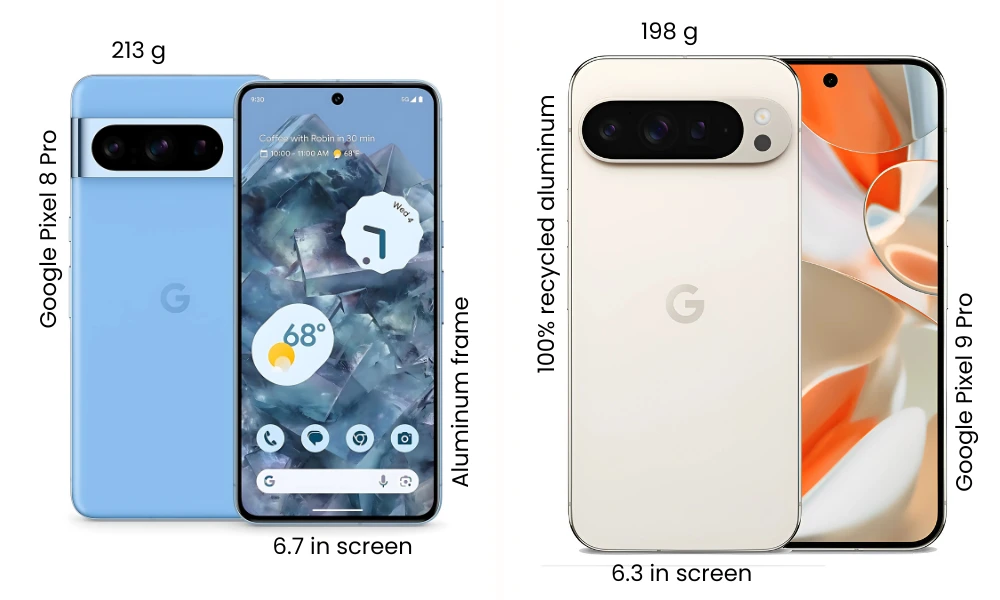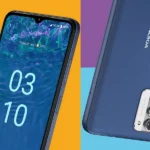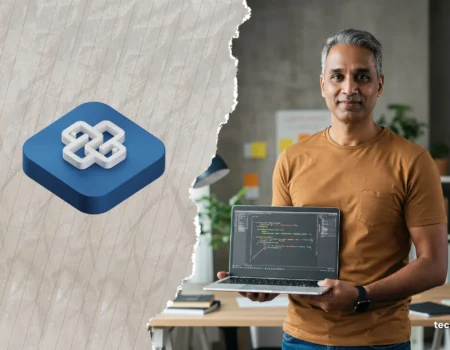Google’s Pixel lineup has consistently set a high bar for Android smartphones.
Both the Pixel 8 Pro and the Pixel 9 Pro carry on this tradition. However, there are clear distinctions between the two models.
In this review, I’ll highlight the key differences to help you choose the right phone for you.
Let’s get into it.
Similar review: Samsung Galaxy Z Fold 6 and Z Flip 6 Review: New Upgrades
Pixel 8 Pro vs. Pixel 9 Pro Spec
| Category | Pixel 8 Pro | Pixel 9 Pro |
|---|---|---|
| Colors | Bay, Mint, Obsidian, Porcelain | Porcelain, Rose Quartz, Hazel, Obsidian |
| Display | 6.7-inch Super Actua LTPO OLED, 1344 x 2992, 489 PPI | 6.3-inch Super Actua LTPO OLED, 1280 x 2856, 495 PPI |
| 1-120 Hz refresh rate | 1-120 Hz refresh rate | |
| Brightness | 2400 nits peak, 1600 nits HDR | 3000 nits peak, 2000 nits HDR |
| >1,000,000:1 contrast ratio, HDR, 24-bit color depth | >2,000,000:1 contrast ratio, HDR, 24-bit color depth | |
| Dimensions & Weight | 162.6 x 76.5 x 8.8 mm (6.4 x 3.0 x 0.3 in), 213 g (7.5 oz) | 152 x 71 x 7.9 mm (6 x 2.8 x 0.3 in), 198 g (7 oz) |
| Battery | 5050 mAh, 24+ hour battery, 72-hour with Extreme Saver | 4700 mAh, 24+ hour battery, 100-hour with Extreme Saver |
| Fast charging | 50% in 30 min with 30W charger | 55% in 30 min with 45W charger |
| Wireless charging, Battery Share | Wireless charging, Battery Share | |
| Processor | Google Tensor G3 | Google Tensor G4 |
| RAM | 12 GB LPDDR5X | 16 GB LPDDR5X |
| Storage Options | 128 GB, 256 GB, 512 GB, 1 TB (UFS 3.1) | 128 GB, 256 GB, 512 GB, 1 TB (UFS 4.0) |
| Operating System | Launched with Android 14 | Launched with Android 14 |
| Security Features | Titan M2, Tensor Security Core, 7 years of updates | Titan M2, Tensor Security Core, 7 years of updates |
| Face Unlock, Fingerprint Unlock | Face Unlock, Fingerprint Unlock | |
| Rear Camera System | Triple camera: 50 MP wide, 48 MP ultrawide, 48 MP telephoto | Triple camera: 50 MP wide, 48 MP ultrawide, 48 MP telephoto |
| 50 MP wide (f/1.68, 1/1.31″ sensor) | 50 MP wide (f/1.68, 1/1.31″ sensor) | |
| 48 MP ultrawide (f/1.95, 125.5° FoV) | 48 MP ultrawide (f/1.7, 123° FoV, Macro Focus) | |
| 48 MP telephoto (f/2.8, 5x optical zoom) | 48 MP telephoto (f/2.8, 5x optical zoom) | |
| Super Res Zoom up to 30x | Super Res Zoom up to 30x | |
| Laser detect autofocus, OIS, EIS | Laser detect autofocus, OIS, EIS | |
| Front Camera | 10.5 MP (f/2.2, 95° FoV) | 42 MP (f/2.2, 103° FoV) |
| Video Recording | 4K @ 24/30/60 FPS (rear and front) | 8K @ 30 FPS (rear), 4K @ 24/30/60 FPS (rear and front) |
| Night Sight Video, Cinematic Blur, Audio Magic Eraser | Night Sight Video, Cinematic Blur, 8K recording | |
| Slo-mo up to 240 FPS | Slo-mo up to 240 FPS | |
| Connectivity | Wi-Fi 7, Bluetooth 5.3, NFC, UWB | Wi-Fi 7, Bluetooth 5.3, NFC, UWB |
| 5G (mmWave + Sub 6GHz) | 5G (mmWave + Sub 6GHz) | |
| SIM Support | Dual SIM (Nano SIM + eSIM) | Dual SIM (Nano SIM + eSIM) |
| Durability | Corning Gorilla Glass Victus 2 (front and back), IP68 | Corning Gorilla Glass Victus 2 (front and back), IP68 |
| Recycled materials in aluminum housing | 100% recycled aluminum housing | |
| Audio | Stereo speakers, 3 microphones, spatial audio | Stereo speakers, 3 microphones, spatial audio |
| Sensors | Temperature sensor, barometer, proximity, ambient light | Temperature sensor, barometer, proximity, ambient light |
| Safety Features | Car Crash Detection, Emergency SOS | Car Crash Detection, Satellite SOS, Emergency SOS |
| In the Box | USB-C to USB-C cable, SIM tool | USB-C to USB-C cable, SIM tool |
Design and Build

When comparing the design of the Pixel 8 Pro and Pixel 9 Pro, you’ll notice subtle differences.
The Pixel 8 Pro weighs in at 213 grams. And features a polished aluminum frame with Corning Gorilla Glass Victus 2.
Its edgeless matte back adds to the premium feel. With IP68 water and dust resistance, durability is well covered.
On the other hand, the Pixel 9 Pro takes a step ahead. It uses 100% recycled aluminum for its housing and offers a lighter build at 198 grams (7 oz).
It maintains the same level of IP68 durability but with a slightly smoother, polished finish.
If eco-consciousness matters, this is a small but meaningful upgrade.
The Pixel 9 Pro also comes with fresh color options like Hazel and Rose Quartz, adding a bit more personality to the mix.
The Pixel 9 Pro feels lighter, slightly more refined, and environmentally friendlier. But both models offer similar protection and premium materials.
Display
The display is where the differences between the two models become more apparent.
The Pixel 8 Pro has a 6.7-inch LTPO OLED screen with a 1344 x 2992 resolution, delivering 489 PPI.
It can reach up to 2400 nits of peak brightness. This makes the screen vibrant and clear, even under direct sunlight.
Also, it feels smooth with the 120Hz refresh rate.
In contrast, the Pixel 9 Pro shrinks the screen slightly to 6.3 inches.
But despite the smaller size, it offers a higher peak brightness of 3000 nits and a slightly sharper 495 PPI.
So, the Pixel 9 Pro is brighter, but the smaller screen might not be ideal for most of us.
If you prefer a larger screen, the Pixel 8 Pro edges ahead.
But if outdoor visibility and sharper pixel density are important, the Pixel 9 Pro’s display might suit you better.
A similar phone: Infinix Zero 40 5G Review – Features and Specs
Performance and Processing Power
Both phones are powered by Google’s in-house chips, but there’s a noticeable difference in performance.
The Pixel 8 Pro runs on the Google Tensor G3 chip and comes with 12GB of RAM.
It’s more than capable of heavy-duty tasks like gaming, and multitasking without stuttering.
Machine learning tasks, such as AI-based photo editing, run smoothly.
However, the Pixel 9 Pro takes it up a notch with the Google Tensor G4 chip and 16GB of RAM.
The extra power makes AI tasks like image editing and gaming smoother.
So, if you use these often, the Pixel 9 Pro is quicker.
I’d choose the Pixel 9 Pro for its Tensor G4 chip and extra RAM, making it best for power use.
Camera System
Google’s Pixel series is known for great photography, and both phones live up to that reputation.
The Pixel 8 Pro has a 50 MP wide camera, a 48 MP ultrawide. And a 48 MP telephoto lens with 5x zoom.
It performs well in various conditions, whether zooming in or capturing wide landscapes.
Plus, features like Magic Eraser, Real Tone, and Photo Unblur enhance the photography experience.
The Pixel 9 Pro features a 50 MP wide, 48 MP ultrawide with Macro Focus. And a 48 MP telephoto with 5x zoom.
Its front camera upgrades to 42 MP from the Pixel 8 Pro’s 10.5 MP, improving selfie quality.
Plus, it supports 8K video recording, a step up from the Pixel 8 Pro’s 4K.
So, I would go with the Pixel 9 Pro for better selfies, macro shots, and advanced video recording.
Battery and Charging
The Pixel 8 Pro features a larger 5050 mAh battery. This provides over 24 hours of regular use and up to 72 hours with Extreme Battery Saver.
It supports fast charging, reaching 50% in about 30 minutes with a 30W charger.
In contrast, the Pixel 9 Pro has a slightly smaller 4700 mAh battery.
However, it is optimized for better efficiency. It can last up to 100 hours with Extreme Battery Saver.
Additionally, it charges faster—up to 55% in 30 minutes with a 45W charger.
The smaller battery benefits from software optimizations that manage power effectively.
Although the Pixel 8 Pro has a larger battery, the Pixel 9 Pro charges faster.
Security and Software Updates
Both phones provide 7 years of OS, security, and feature updates, ensuring long-term support.
The Pixel 9 Pro also adds Satellite SOS for emergencies, making it a better option concerning safety.
Special Features
The Pixel 8 Pro has features like Magic Eraser, Photo Unblur, and Astrophotography that improve its camera experience.
The Pixel 9 Pro retains these features. It also adds enhancements like 8K Video Boost, Super Res Zoom Video, and Zoom Enhance.
Storage Options
The Pixel 8 Pro and Pixel 9 Pro offer storage options from 128GB to 1TB
However, the Pixel 9 Pro has 16GB of RAM, while the Pixel 8 Pro has 12GB.
Both phones share the same storage options, making RAM and performance upgrades the main differences.
However, the Pixel 9 Pro is priced higher than the Pixel 8 Pro, near to iPhone 16.
What to Choose?
I would choose the Pixel 8 Pro for its larger display, great photography, and lower price.
It’s an excellent option with a few exceptions in performance.
However, if you want the best from Google, the Pixel 9 Pro is worth the extra cost.
It has a sharper display, a better front camera, and enhanced features. Overall, it’s the best in performance and usability.







No Comment! Be the first one.